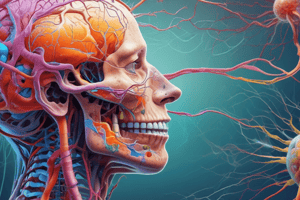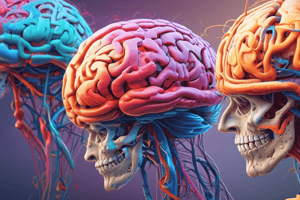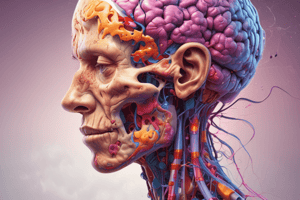Podcast
Questions and Answers
What is a key consideration in patient management regarding nervous system disorders?
What is a key consideration in patient management regarding nervous system disorders?
- Nervous system disorders have little impact on oral health.
- A referral to other health professionals is unnecessary.
- Understanding the signs and symptoms is crucial for proper care. (correct)
- Patient history is not relevant.
Which outcome emphasizes the need for comprehensive patient history?
Which outcome emphasizes the need for comprehensive patient history?
- 1.5.4 Identify patients' needs from the treatment plan.
- 1.2.2 Recognise the importance of and record a comprehensive and contemporaneous patient history. (correct)
- 1.10.2 Provide patients with comprehensive preventive education.
- 1.1.3 Explain general and systemic disease.
What approach should be taken when treating patients with nervous system disorders?
What approach should be taken when treating patients with nervous system disorders?
- Communicate effectively to manage anxiety and pain. (correct)
- Only focus on dental treatment without considering psychological aspects.
- Treat all patients equally without regard for their conditions.
- Use generic pain management techniques regardless of the patient's needs.
Which learning outcome specifically deals with the referral process in patient management?
Which learning outcome specifically deals with the referral process in patient management?
Why is it important to recognize the signs of abuse or neglect in patients with nervous system disorders?
Why is it important to recognize the signs of abuse or neglect in patients with nervous system disorders?
How should dental professionals approach preventive education for patients with nervous system issues?
How should dental professionals approach preventive education for patients with nervous system issues?
What is a major risk when managing patients in the dental environment, particularly for those with nervous system disorders?
What is a major risk when managing patients in the dental environment, particularly for those with nervous system disorders?
What should be the priority when delivering care to patients with anxiety related to nervous system disorders?
What should be the priority when delivering care to patients with anxiety related to nervous system disorders?
What does the outcome 1.5.2 specifically address regarding treatment?
What does the outcome 1.5.2 specifically address regarding treatment?
Which learning outcome highlights the importance of managing differing patient needs?
Which learning outcome highlights the importance of managing differing patient needs?
Which of the following is classified as a condition affecting the central nervous system?
Which of the following is classified as a condition affecting the central nervous system?
What is a common cause of neurological disorders related to underlying health conditions?
What is a common cause of neurological disorders related to underlying health conditions?
Which symptom is NOT typically associated with neurological disorders?
Which symptom is NOT typically associated with neurological disorders?
Medication side effects in patients with neurological disorders do NOT often result in which of the following?
Medication side effects in patients with neurological disorders do NOT often result in which of the following?
Which of the following conditions is NOT directly related to the peripheral nervous system?
Which of the following conditions is NOT directly related to the peripheral nervous system?
How might dysphagia present in patients with neurological disorders?
How might dysphagia present in patients with neurological disorders?
Which of the following is a risk factor for developing neurological disorders?
Which of the following is a risk factor for developing neurological disorders?
Which of the following is included in the dental considerations for patients with nervous disorders?
Which of the following is included in the dental considerations for patients with nervous disorders?
Which presentation may indicate a serious issue related to neurological health?
Which presentation may indicate a serious issue related to neurological health?
What type of neurological disorder is Parkinson’s disease classified under?
What type of neurological disorder is Parkinson’s disease classified under?
What condition is characterized by inflammation of the membranes covering the brain and spinal cord?
What condition is characterized by inflammation of the membranes covering the brain and spinal cord?
Which disorder primarily affects the myelin sheath of nerves?
Which disorder primarily affects the myelin sheath of nerves?
What is NOT a symptom of Peripheral Neuropathy?
What is NOT a symptom of Peripheral Neuropathy?
Which of the following is a genetic disorder that affects movement and cognition?
Which of the following is a genetic disorder that affects movement and cognition?
What condition results from abnormal electrical activity in the brain leading to recurrent seizures?
What condition results from abnormal electrical activity in the brain leading to recurrent seizures?
Which condition is often associated with chronic high blood sugar levels?
Which condition is often associated with chronic high blood sugar levels?
What symptom is most likely associated with Alzheimer’s Disease?
What symptom is most likely associated with Alzheimer’s Disease?
Which disorder is characterized by progressive muscle rigidity and slow movement?
Which disorder is characterized by progressive muscle rigidity and slow movement?
What condition involves abnormal growths in the brain that can be benign or malignant?
What condition involves abnormal growths in the brain that can be benign or malignant?
Which condition is commonly linked to compression of the median nerve?
Which condition is commonly linked to compression of the median nerve?
Which condition is characterized by the immune system attacking peripheral nerves, leading to muscle weakness?
Which condition is characterized by the immune system attacking peripheral nerves, leading to muscle weakness?
Which of the following is a common consequence of sciatica?
Which of the following is a common consequence of sciatica?
What is a major risk factor for the development of neurological disorders?
What is a major risk factor for the development of neurological disorders?
Which infection can directly damage the nervous system?
Which infection can directly damage the nervous system?
Which of the following is a significant symptom of neurological disorders?
Which of the following is a significant symptom of neurological disorders?
What is a common side effect of medications used for neurological conditions?
What is a common side effect of medications used for neurological conditions?
Which type of injury is classified under trauma-related nervous system disorders?
Which type of injury is classified under trauma-related nervous system disorders?
In which condition might you observe sudden weakness or paralysis of facial muscles?
In which condition might you observe sudden weakness or paralysis of facial muscles?
What might require a change in the treatment environment for patients with neurological conditions?
What might require a change in the treatment environment for patients with neurological conditions?
Which symptom might indicate cognitive changes in a patient with a neurological disorder?
Which symptom might indicate cognitive changes in a patient with a neurological disorder?
Flashcards
Central Nervous System (CNS)
Central Nervous System (CNS)
The brain and spinal cord, controlling and coordinating bodily functions.
Peripheral Nervous System (PNS)
Peripheral Nervous System (PNS)
Nerves outside the brain and spinal cord, responsible for communication between the CNS and the rest of the body.
Brain Tumors
Brain Tumors
Abnormal growths in the brain, causing various symptoms such as headaches and seizures.
Encephalitis
Encephalitis
Signup and view all the flashcards
Epilepsy
Epilepsy
Signup and view all the flashcards
Meningitis
Meningitis
Signup and view all the flashcards
Multiple Sclerosis (MS)
Multiple Sclerosis (MS)
Signup and view all the flashcards
Alzheimer's Disease
Alzheimer's Disease
Signup and view all the flashcards
Parkinson's Disease
Parkinson's Disease
Signup and view all the flashcards
Huntington's Disease
Huntington's Disease
Signup and view all the flashcards
Peripheral Neuropathy
Peripheral Neuropathy
Signup and view all the flashcards
Diabetic Polyneuropathy
Diabetic Polyneuropathy
Signup and view all the flashcards
Guillain-Barré Syndrome
Guillain-Barré Syndrome
Signup and view all the flashcards
Sciatica
Sciatica
Signup and view all the flashcards
Facial Nerve Paralysis (Bell's Palsy)
Facial Nerve Paralysis (Bell's Palsy)
Signup and view all the flashcards
Congenital Nervous System Disorders
Congenital Nervous System Disorders
Signup and view all the flashcards
Vascular Nervous System Disorders
Vascular Nervous System Disorders
Signup and view all the flashcards
Infectious Nervous System Disorders
Infectious Nervous System Disorders
Signup and view all the flashcards
Degenerative Nervous System Disorders
Degenerative Nervous System Disorders
Signup and view all the flashcards
Traumatic Nervous System Disorders
Traumatic Nervous System Disorders
Signup and view all the flashcards
Environmental Factors Affecting the Nervous System
Environmental Factors Affecting the Nervous System
Signup and view all the flashcards
Pain
Pain
Signup and view all the flashcards
Muscle Malfunction
Muscle Malfunction
Signup and view all the flashcards
Changes in Sensation
Changes in Sensation
Signup and view all the flashcards
Special Sensory Changes
Special Sensory Changes
Signup and view all the flashcards
Sleep Problems
Sleep Problems
Signup and view all the flashcards
Consciousness Changes
Consciousness Changes
Signup and view all the flashcards
Cognitive Changes
Cognitive Changes
Signup and view all the flashcards
Study Notes
Nervous System Disorders
- A physical condition that affects the Central Nervous System (CNS) and the Peripheral Nervous System (PNS)
- Common CNS disorders include brain tumours, encephalitis, epilepsy, meningitis, multiple sclerosis, Alzheimer’s, Parkinson’s, and Huntington’s disease
- Common PNS disorders include peripheral neuropathy, diabetic polyneuropathy, Guillain-Barre syndrome, and sciatica
- Causes include congenital defects, vascular issues, infections (fungal, viral, bacterial, parasitic), degenerative diseases, trauma, environmental factors, habits, other health conditions, gender, age, and genetics
- Presenting symptoms include pain, muscle malfunction, changes in sensation, changes in the special senses, sleep problems, changes in consciousness, changes in cognition, dysphagia, dysarthria
- Dental considerations are medication side effects, medication interactions, consent, access, compliance with treatment, behaviour management, impaired memory, and additional equipment
Dental Implications
- Dental professionals should educate patients on the potential impact of nervous system disorders on dental treatment
- Patients with nervous system disorders may be more susceptible to dental complications, and thus require more frequent dental checkups
- Patients might have difficulty managing their oral hygiene, making it essential to provide additional support and instruction
- Modifications to treatment plans may be necessary to address patient specific needs and provide appropriate care
- Dental professionals should be aware of the potential for medication interactions and side effects, and take them into consideration when providing dental care
Presentation
- Students are tasked with creating a presentation on a specific nervous system disorder
- The presentation must include a definition, cause, treatment, dental implications, and modified dental treatment considerations
- Students will create a poster design which can include a mind map, PowerPoint slides, or a combination of both
- All sources must be properly referenced
Nervous System Disorders: An Overview
- Nervous system disorders affect either the central nervous system (CNS) or the peripheral nervous system (PNS), causing disruptions in physical, cognitive, and sensory functions.
Central Nervous System Disorders
- CNS includes the brain and spinal cord.
- Brain Tumors: Abnormal growths in the brain, causing various symptoms like headaches and seizures.
- Encephalitis: Brain inflammation, often caused by infections, leading to fever and potential coma.
- Epilepsy: Recurrent seizures due to abnormal electrical activity in the brain.
- Meningitis: Inflammation of the membranes covering the brain and spinal cord (meninges), often due to infection, causing a stiff neck and fever.
- Multiple Sclerosis (MS): Progressive disease affecting the myelin sheath, causing weakness and coordination problems.
- Alzheimer’s Disease: Neurodegenerative condition causing memory loss and significant cognitive decline.
- Parkinson’s Disease: Progressive disorder affecting movement, characterized by tremors and slow movement.
- Huntington’s Disease: Genetic disorder causing the breakdown of nerve cells, leading to movement disorders and cognitive decline.
Peripheral Nervous System Disorders
- PNS comprises nerves outside the brain and spinal cord.
- Peripheral Neuropathy: Damage to peripheral nerves, causing pain, numbness, and weakness in limbs.
- Diabetic Polyneuropathy: Nerve damage caused by high blood sugar levels in diabetics, leading to sensory loss and potential foot ulcers.
- Guillain-Barré Syndrome: Immune system attacking peripheral nerves, causing muscle weakness and paralysis.
- Sciatica: Compression of the sciatic nerve, resulting in lower back pain radiating down the legs.
- Facial Nerve Paralysis (Bell’s Palsy): Sudden weakness or paralysis of facial muscles, often on one side, due to facial nerve damage.
Causes of Nervous System Disorders
- Congenital: Conditions present at birth, such as cerebral palsy.
- Vascular: Impaired blood flow, leading to stroke or aneurysm.
- Infections: Bacterial (meningitis), viral (encephalitis), fungal, or parasitic infections can cause nervous system damage.
- Degenerative: Progressive cell damage, as seen in Alzheimer’s and Parkinson’s disease.
- Trauma: Physical injury, such as traumatic brain injury (TBI) or spinal cord injury.
- Environmental Factors: Exposure to toxins like heavy metals or alcohol.
Risk Factors
- Lifestyle factors like smoking and poor diet, co-morbidities like diabetes and hypertension, age, genetics, and gender.
Symptoms of Nervous System Disorders
- Pain: Common symptom in conditions like neuropathy and sciatica.
- Muscle Malfunction: Weakness, loss of coordination, or involuntary movements (tremors or spasticity).
- Changes in Sensation: Numbness, tingling, or loss of sensation, often seen in peripheral neuropathies.
- Special Sensory Changes: Vision (blurred or double vision in MS), hearing loss, or taste changes.
- Sleep Problems: Disrupted sleep cycles, leading to insomnia or excessive sleepiness.
- Consciousness Changes: Seizures, loss of consciousness, or cognitive slowing.
- Cognitive Changes: Memory loss, confusion, language difficulties, and impaired judgment.
Dental Considerations for Neurological Patients
- Medication Side Effects: Common medications for neurological conditions may cause dry mouth, bleeding, or increased infection risk.
- Medication Interactions: Be cautious of interactions between neurological medications and dental medications.
- Consent: Patients with cognitive disorders may struggle with providing informed consent.
- Access: Patients with mobility issues need assistance moving in and out of the dental chair.
- Compliance: Neurological disorders may impair a patient’s ability to comply with oral hygiene practices.
- Behaviour Management: Patients with anxiety or involuntary movements may require patience and reassurance.
- Impaired Memory: Patients may forget appointments or oral hygiene instructions.
- Special Considerations and Equipment: Tailor dental treatments with consideration for physical impairments, using mouth props or adaptive tools.
Studying That Suits You
Use AI to generate personalized quizzes and flashcards to suit your learning preferences.




